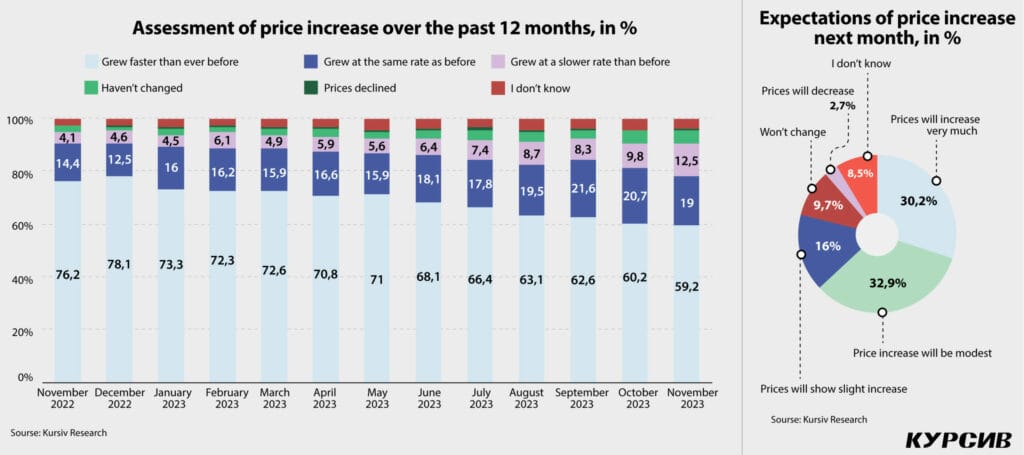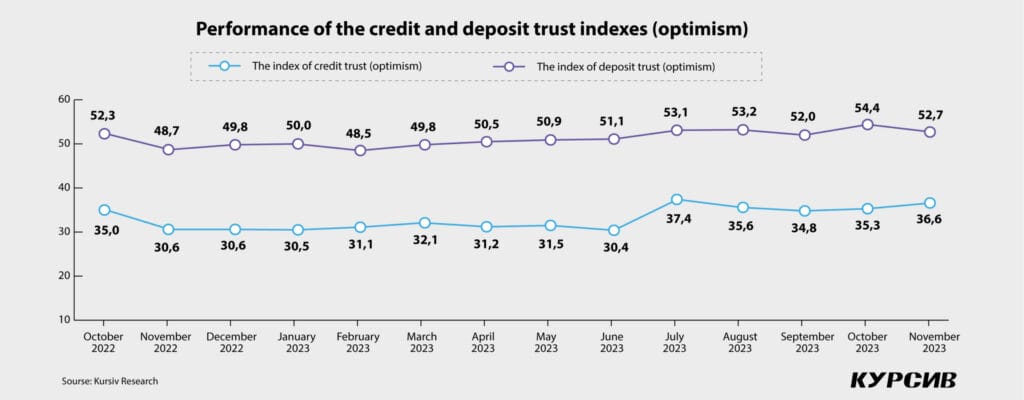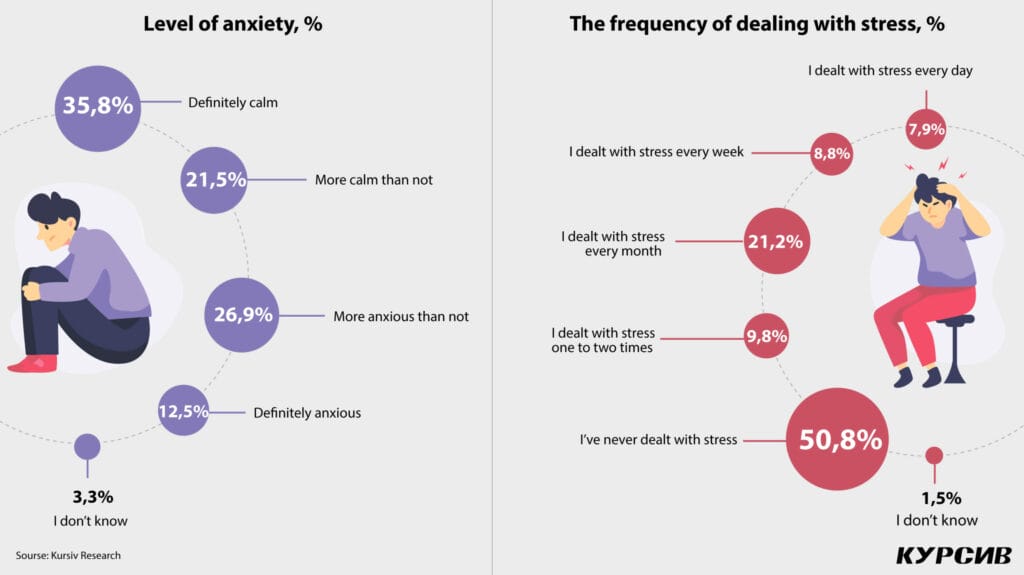Consumer confidence grows by leaps and bounds in Kazakhstan
The Consumer Confidence Index (CCI) has been setting records for the second month in a row in Kazakhstan. The number of people confident in their jobs and willing to take a loan is also growing. Kazakhstan is approaching the year’s end amid slowing inflation, although many in the country are expecting future price increases. In this monthly survey, Kursiv Research has shown what Kazakhstanis thought about the economic situation in November.

Increase in confidence
In October, CCI reached 103.3 points and hit a record of observation. It turned out to be the beginning of a new trend. In November, CCI rose a bit higher by 4.9 points and reached 108.2.
Of course, subindexes have grown as well. For instance, the index of economic situation changes rose by 8.9 points, while the index of current state assessment and the index of consumer expectations increased by 6.3 and 3.1 points, respectively.
The index of personal financial situation changes has shown the lowest growth and increased by just 2.3 points.

Youth is optimistic, while elderly people are undemonstrative
In November, men and women were both quite optimistic about their consuming capabilities. CCI for these gender categories was 108.3 and 108.2 points, respectively. The index was growing most actively for men: the indicator for this group grew by 5.8 points over the month.
Respondents of medium age (30 to 44) and young people were also optimistic with CCI at 108.5 and 127.9, respectively. The latter category demonstrated the highest growth of the index, though.
On the other hand, respondents close to retirement and already retired traditionally were less positive when assessing the current situation. For these groups of survey participants, CCI was at 98.6 and 95.2, respectively.
CCI was growing in the majority of regions
In the Jetysu region of Kazakhstan, where CCI demonstrated a slight decline in October, public sentiment sharply changed in November: the index grew by 17.9 points. This surge was the most impressive among all CCI increases in other regions. However, the Kyzylorda region reported the highest rate of index growth in absolute figures (126.1).
Only two regions reported a decline in CCI: West Kazakhstan (by 7.9 points) and East Kazakhstan (by 0.6 points).
CCI entered a pessimistic zone (rates lower than 100 points) in the Pavlodar, Karaganda, East Kazakhstan and North Kazakhstan regions.
The finance issue is the most painful
The number of people worrying about financial difficulties slightly grew in November: 24.6% compared to 22.8% in October. On the other hand, the respondents were less concerned about inflation, tariffs and price surges in November: 8.8% compared to 10.5% in the prior monthly survey.
About 8.5% of respondents Kursiv Research talked with were most interested in questions related to jobs, business and study. Another 8.3% of the respondents were focused mainly on family issues, 7.4% on health issues and 6.3% said that they were concerned about problems with education.
Interestingly, the category of those who weren’t worrying about anything hasn’t changed – 31.3% or every third respondent surveyed in November. An additional 4.5% of participants were unable to decisively say what they were worrying about.
Easy inflation
According to the Bureau of National Statistics, inflation in Kazakhstan is slowing down. For instance, in November the rate decreased to 10.3% compared to 11.8% in September and 10.8% in October.
As a result, the portion of the population that has a sense of annual price surge has been decreasing. In May 2023, 71% of respondents felt a price increase, 60.2% in October and 59.2% in November.
The share of those who suffered from monthly price increases also declined. In November it was 47.7%, compared to 48.8% in October and 53.9% in September.
Who are the most annoyed with price increase
In November, women noticed price increases more often than men, which is quite usual. For example, 63.8% of women mentioned annual price surges and 52.5% of them noticed price increases last month.
Mainly, the issue of price increase was annoying for the respondents aged 30 to 44 in the Ulytau, Almaty and Pavlodar regions.
All eyes on the price of meat, milk and bread
Those respondents who were worrying about price increases often talked about staple products. In particular, 34.9% of the survey’s participants complained about the high price of meat and poultry, 32.8% — bakery products, 31.6% — milk and dairy products, 29.5% — vegetables and fruits and 28.9% — flour.
At the same time, almost all these figures were lower than in October. The median evaluation of expected inflation was 20% in November, which was the same as in October.
In expectation of a price surge
There are two different trends in the country. On the one hand, the share of those who notice price increases has been decreasing. On the other hand, the portion of those who are expecting price increases in the future is growing. The number of those who were expecting a sharp price increase in December rose from 24.6% to 30.2%, while the number of those who anticipate the same next year grew from 24.4% to 27.3%. Women aged 30 to 59 and residents of the Pavlodar region were the most pessimistic.

The USD position has strengthened
In November, Kazakhstanis demonstrated more faith in the U.S. dollar. The share of those who expected the USD to grow soon rose by 1.7 percentage points from 34.4% to 36.1%. The number of respondents expecting the same trend year-on-year rose from 53.9% to 55.4%.
Men, young people and residents of the capital city showed the most positive attitude toward the future USD exchange rate.
Employment issue recedes into the background
The index of unemployment expectations continued to grow in November: it rose by 2.2 p.p. and reached 75. This means that Kazakhstanis were less worried about employment last month because this rate has an inverse relation with the fear of unemployment.

The portion of those respondents who believe that the number of jobless people is going to be higher in one year dropped slightly from 41.4% to 40.3%. The residents of the Atyrau region were the most pessimistic about the labor market: 57.9% of the local respondents said that they expected the situation to worsen. Respondents aged 45 to 59 were also quite pessimistic about the issue.
It’s time to spend money, not save it
The number of Kazakhstanis who believe that it is the right time to take a loan has been increasing. In September, only 13.8% of the respondents said that, 14.8% in October and 16.6% in November. The customer credit trust index, which is another indicator of customer optimism, has also grown. In November, it reached 36.6 p.p.
Women, young people and residents of Kyzylorda and Turkestan regions demonstrated the biggest interest in loans in November.
The share of those respondents who are going to borrow money has been growing for the second month in a row. In September, 17.9% of the survey’s participants said that, 19.9% in October and 21.7% in November. People aged 60 and above and residents of the North Kazakhstan, Abay and Akmola regions demonstrated the least interest in credits.

In turn, the customer deposit trust index has declined to 52.7 points. The share of those who believe that the end of 2023 isn’t a good time to save money has risen by 2.9%. Interestingly, women are showing more trust in banking deposits than men. Also, young people and residents of Abay, West Kazakhstan, Karaganda regions and the country’s capital city demonstrated the biggest interest in deposits.
Calm, be calm
More than half of the respondents said in November that they were engulfed in calm sentiments (57.3%), which was a one-percentage-point increase over the prior month.
Each fourth participant of the survey (26.9%) complained about their loved ones being worried. Women and people close to their retirement or already retired reported that problem more often. Moreover, the number of residents of the Ulytau, Kostanay, East Kazakhstan and Pavlodar regions who had that sense was quite high.

However, the majority of those who took part in the survey by Kursiv Research (50.8%) in November didn’t feel stressed at all. About a third (30%) said that they dealt with stress with a frequency of several times per week to several times per month.
Women, people aged 30 to 44 and residents of the East Kazakhstan, North Kazakhstan, Ulytau and Kostanay regions as well as the cities of Almaty and Astana admitted that they have felt a sense of stress very often.
The bottom line
In November 2023, Kazakhstanis showed an increase in consumer confidence and optimism. The country’s residents were less worried about product and service price increases, became more positive toward their perspective on the labor market and reported less anxiety and stress. On the eve of New Year, people also demonstrate less appetite for saving money and are ready to spend either their own money or borrowed funds.
At the same time, Kazakhstanis are expecting a price surge and further strengthening of the USD exchange rate. Kursiv Research will continue to measure the opinions of our fellow citizens in surveys to come.
